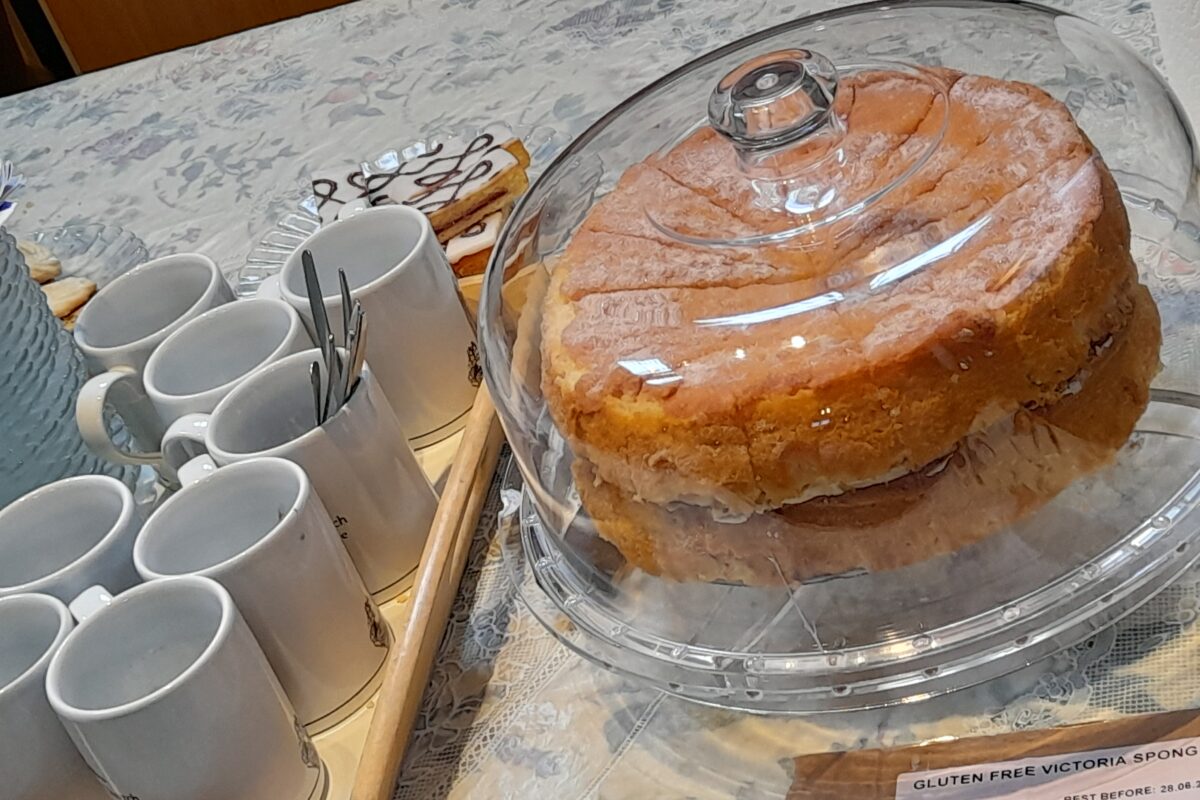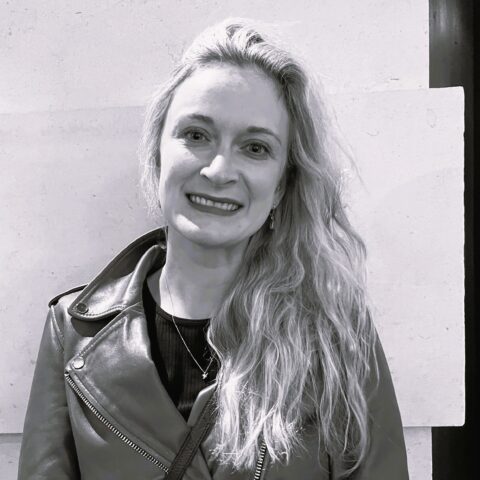There aren’t that many places in London where, in a two-hour period, you can: read the paper, have brunch, do an exercise class, join a quiz team, sing songs, listen to live poetry, browse a white elephant stall, and catch up with friends. However, if you are attending a Memory café, this is what you might expect.
Our logic behind making the session action-packed is that it signals that we know that elders have a lot of life and fun in them.
Steven Morris, “Memory Café: How to Engage with Memory Loss and Build Community” (Grove)
St Cuthbert’s, Wembley
The first memory café I visited was hosted by St Cuthbert’s, Wembley. Established by former incumbent Steven Morris in 2015, this café was a trailblazer for the memory café concept. It has inspired numerous others within Brent, making Brent the best served area within the Diocese for dementia ministry. Nine years later, it continues to flourish.
Before arriving at the café, I’d been unsure of what to expect. This was my first church visit for the Compassionate Communities team, and I was worried I might feel like an interloper. However, the welcome that I (and all the guests) received couldn’t have been warmer. I was invited to help myself from a mound of edible treats, laid out by a dedicated team of volunteers. Food had come from a range of sources outside of the church budget, including products ‘too good to waste’ from local businesses via Neighbourly; bargain goodies bought from wholesalers by volunteers; and food prepared by café guests. As I sat down with my coffee and pastry, one guest told me that she had previously run a catering company – her contribution to the café, where she was a regular, included vegetable curry and chapatis made fresh that morning.
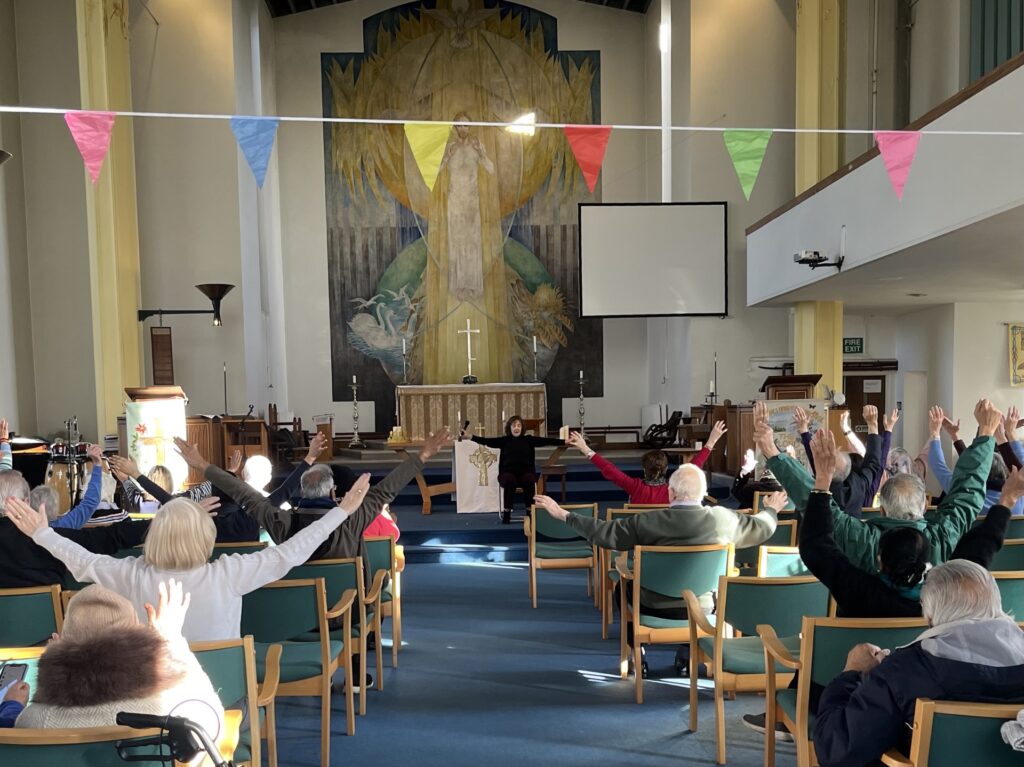
After coffee, came the quiz and I was cajoled into joining a rowdy team of friends, who evidently expected my general knowledge to be better than it is… Throughout the quiz, jokes flowed freely – more so than answers – and though we didn’t win any prizes, everyone had a good time. Next came exercises and music.
The highlight for me was seeing David, a gentleman in his 90s with quite advanced dementia, take to the piano to perform a jazzy set of tunes that got everyone dancing. He played without sheet music and couldn’t comment much on what he’d performed – the music had joyously poured forth from his longer-term and muscle memory.
Piano at St Cuthbert's Memory Café
Listen here
Christ Church, Highbury
My second visit was to Christ Church, Highbury, whose memory café was recently shortlisted for the Mayor of Islington’s civic award. This time, I had a better sense of what to expect and I arrived to see the same key elements in place: chairs and tables set up café style, home baked cakes donated by congregation members, enthusiastic guests, and a packed schedule.
Exercises came early in the session, led by an external facilitator trained in yoga-inspired, chair-based movement. While the routine was designed for café guests, who typically find it difficult to take physical exercise, carers, volunteers, and visitors all joined in and felt the better for it! The facilitator’s fees were subsidised by a council grant and this, I was informed (and witnessed), was money well spent.
Memory cafés can offer something for mind, body and soul and the intellectual input for this session came partly from an elderly guest, who had suggested that poetry readings be included in the schedule. He led a rendition of Adlestrop by Edward Thomas, and guest were invited to follow along from print-outs. Two of the volunteers had brought their own poems to share – with a humorous poem on aging (Warning by Jenny Joseph) being particularly well received. As was the case at St Cuthbert’s the session closed with a sing-along – two guests (on accordion and vocals) skilfully led the room in songs from the war, music hall classics, popular hymns, and more.
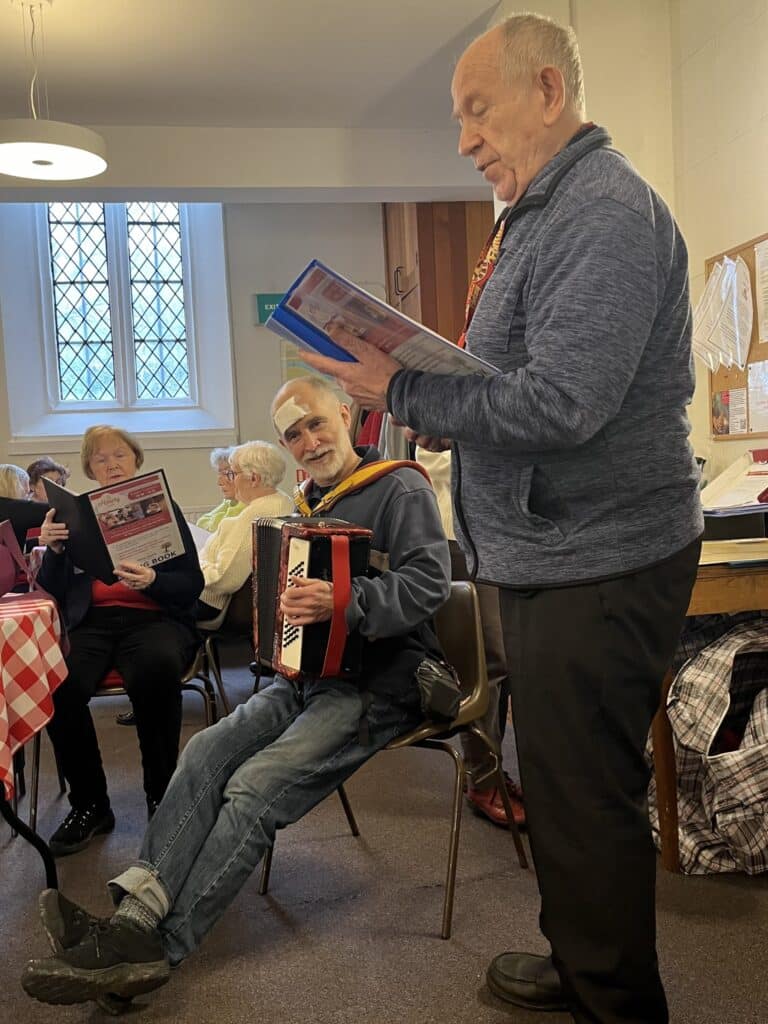
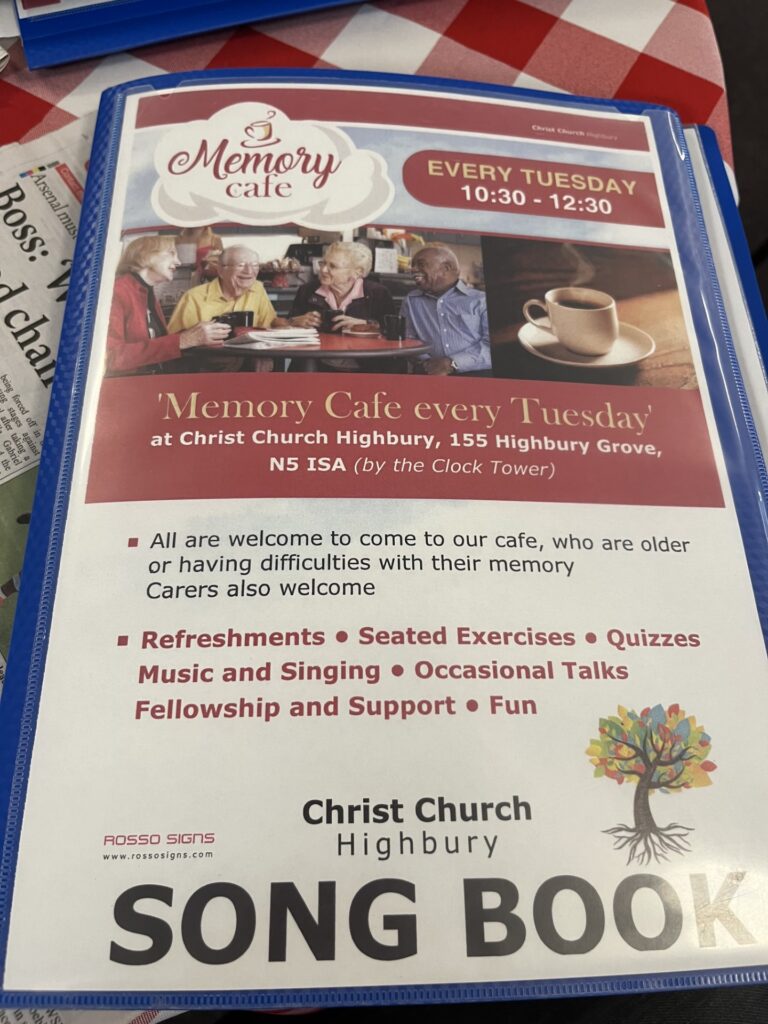
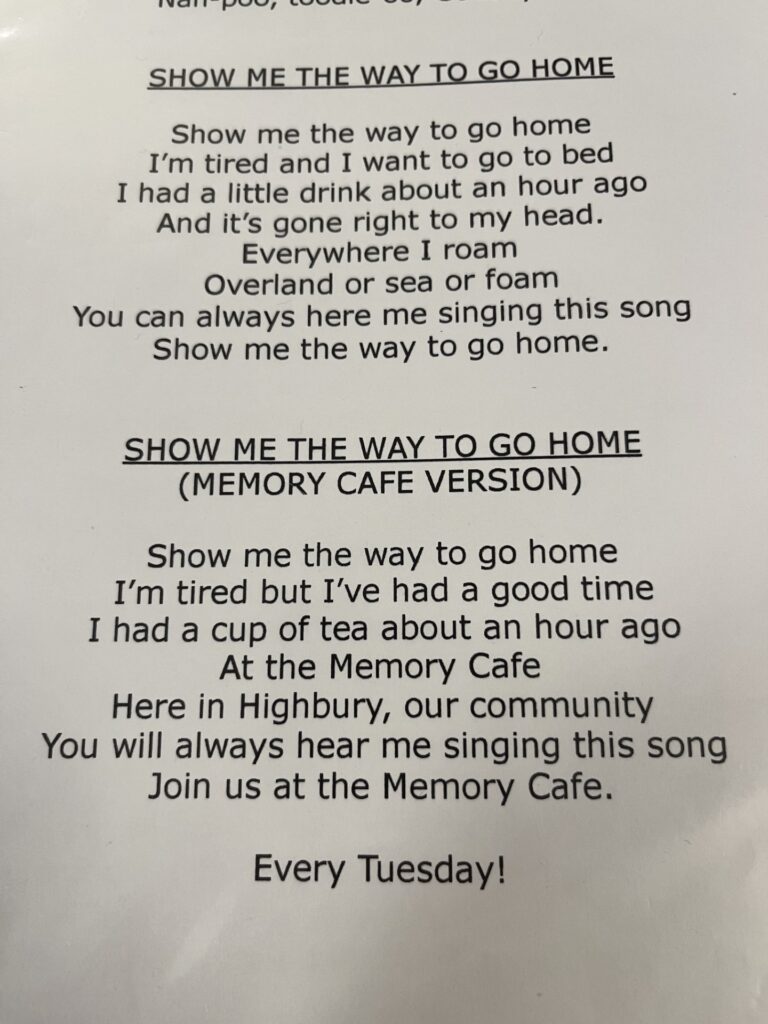
St Marylebone
Research has shown that music can be beneficial for people living with dementia. As well as reducing stress and increasing endorphins, music can serve to improve concentration, cognition, memory, and communication skills. Accordingly, music is at the heart of dementia ministry at St Marylebone, Westminster. This is thanks to effective partnerships with Age UK, Resonate Arts, and the Royal Academy of Music.
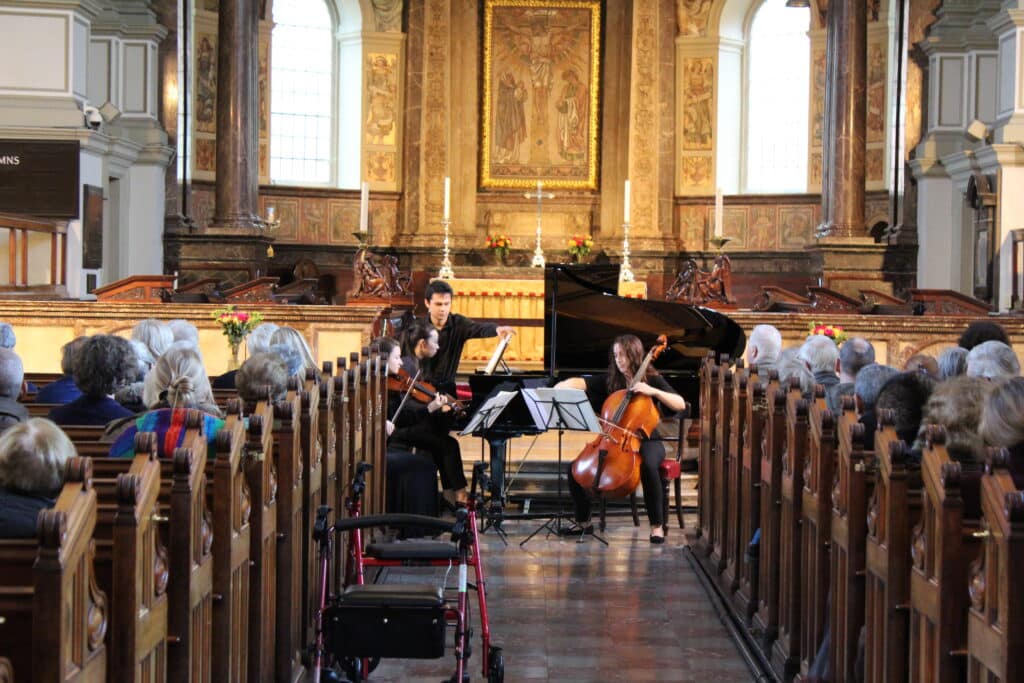
On a bimonthly basis, Resonate Arts brings people from across London, who are living with dementia, for a relaxed classical concert at the church.
Music is provided by Royal Academy students, happy to help and glad of the opportunity to perform for an appreciative audience.
Guests are invited to enjoy refreshments served by pupils from the affiliated school, and to make use of a quiet sensory room if, at any point, the concert environment feels overwhelming.
Closing Thoughts
There are currently 900,000 people in the UK living with dementia. Of these, up to 31,683 are pensioners (people aged 65+) residing within the North and Central London Integrated Care Systems – NHS areas which approximately map onto the London Diocese. While the difficulties associated with a dementia diagnosis are not new, nor is dementia currently in the spotlight of the public imagination, this is, perhaps, a significant season for dementia ministry.
Church communities have seen first-hand how lockdown led to the serious isolation of many older people. COVID necessitated that we take a step back from society and some of us have struggled to re-emerge into a changed social landscape. Older people, who experienced memory loss before lockdown, may have seen their condition worsen due to loneliness and isolation. Considering this alongside the context of an aging population and an aging church, this is an important time to pay heed to the needs of older people among us and respond appropriately where we are able.
Dementia ministry can take a variety of forms and incorporate a whole host of activities. Not all churches will be able to organise fitness instructors or music concerts but, in its simplest form, an effective ministry might just be refreshments, space to chat, and a memory game. When I asked café guests in both Wembley and Highbury what they most appreciated about the cafés, they all gave the same answer: the social aspect, being in community, the opportunity to talk with others and venture out of the home.
Action
- If you are interested in setting up or refreshing a memory café in your church, I would recommend Steven Morris’ Memory Café booklet from Grove as an excellent starting point.
- If you are running a memory café or other dementia ministry and have good ideas to share, please do get in touch. Please do also let us know if we need to add your church to the LDF dementia ministry map.
- Look out for our Memory café toolkit – coming soon to the Compassionate Communities webpage resources.
A number of people very generously made time to discuss or show me their dementia ministries while I was preparing this blog. My grateful thanks to the staff and volunteers at St Cuthbert’s (North Wembley), Christ Church (Highbury), St Marylebone Parish Church (Westminster), St John the Evangelist (Wembley), St Marks’ & St Stephen’s (Enfield), St Peter’s (Acton Green) and St Andrew’s (Southgate) and St Andrew’s (Sudbury).
